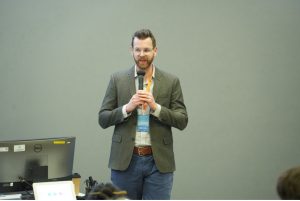 On February 21, the Language and Culture Center (LCC) at Duke Kunshan University successfully hosted its inaugural conference “Think Globally, Act Locally: How We Engage Language and Culture”. The event attracted approximately 120 scholars, educators, and language teaching professionals from prestige institutions, including New York University Shanghai, Xi’an Jiaotong-Liverpool University, Wenzhou-Kean University, The Ohio State University, Beijing Foreign Studies University, Southeast University, City University of Hong Kong, and the University of Nottingham Ningbo China. Gathering in the Academic Building at Duke Kunshan University, participants engaged in a series of insightful lectures and in-depth discussions, collaboratively exploring innovative approaches and practical strategies in language education and intercultural communication.
On February 21, the Language and Culture Center (LCC) at Duke Kunshan University successfully hosted its inaugural conference “Think Globally, Act Locally: How We Engage Language and Culture”. The event attracted approximately 120 scholars, educators, and language teaching professionals from prestige institutions, including New York University Shanghai, Xi’an Jiaotong-Liverpool University, Wenzhou-Kean University, The Ohio State University, Beijing Foreign Studies University, Southeast University, City University of Hong Kong, and the University of Nottingham Ningbo China. Gathering in the Academic Building at Duke Kunshan University, participants engaged in a series of insightful lectures and in-depth discussions, collaboratively exploring innovative approaches and practical strategies in language education and intercultural communication.

Dr. Scott MacEachern, Vice Chancellor of Academic Affairs at Duke Kunshan University, delivered the opening remarks for the conference. He shared his valuable experience of learning 18 diverse languages during his archaeological research in northern Cameroon, West Africa, and highlighted the crucial role of language learning in shaping identity and fostering cultural recognition.

Dr. Francis Troyan, Professor of Multilingual Education at The Ohio State University, delivered an engaging keynote s
peech titled “Integrated Performance Assessment for Engaging Language and Culture.” He critically examined the limitations of current language proficiency assessments and shared insights on implementing integrated performance assessment in university language courses. His approach aims to comprehensively evaluate students’ deep understanding and practical application of both language and culture.
Dr. Don Snow, Professor and Senior Director of the Language and Culture Center, emphasized that the role of language educators goes beyond teaching vocabulary and grammar. More importantly, it involves helping students develop essential life skills, such as exploring the unknown, overcoming cultural and linguistic barriers, and collaborating effectively with people from diverse backgrounds.

Following the keynote speech, attendees joined eleven parallel sessions and an interactive poster session for lively discussions on a range of topics, including the impact of artificial intelligence on writing and learning, perspectives on teaching Chinese as a Second Language, approaches to intercultural communication, and innovations in language assessment. These in-depth and wide-ranging exchanges not only fostered academic dialogues in the field of language education but also provided valuable insights for advancing innovation and development in language teaching.

The conference was hosted by the Language and Culture Center, and generously sponsored by the DKU Humanities Research Center. It provided a platform for language educators from bothdomestic and international institutions to connect and collaboratively explore innovations and improvements in language education.